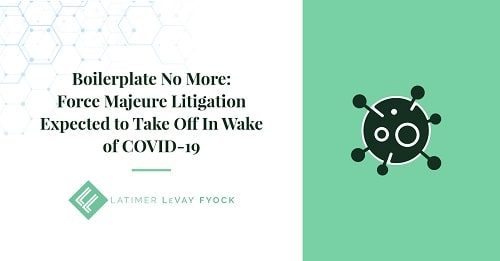Boilerplate No More: Force Majeure Litigation Expected to Take Off In Wake of COVID-19

When business owners, lessees, purchasers, buyers, or other contracting parties review the terms of a proposed agreement, it isn’t unusual for them to wonder why a seemingly simple transaction requires such a lengthy document. Parties must wade through the paragraphs and pages that stand between essential terms like price and performance time and the signature line. But one of those boilerplate provisions that so often sits in the shadows of a contract – force majeure – is about to take the spotlight because of COVID-19.
When Performance or Breach Is an Existential Threat in a Changed World
Generally, a contractual “force majeure” provision addresses the ongoing obligations of parties if extreme and unforeseen circumstances beyond their control make performance impossible or impracticable, or if those circumstances frustrate the central purpose of the agreement. The interpretation, scope, and effect of force majeure provisions are a matter of state law.
In the months and years to come, a wave of litigation about the effect and impact of contractual force majeure provisions is likely to accompany the resumption of regular economic activity. The language of these often overlooked and rarely invoked terms, and how courts interpret that language in the context of a specific agreement, is the battleground on which breach of contract cases will be fought when one party seeks to invoke force majeure to excuse their performance.
The pandemic and the ensuing decrease or cessation of commercial activity has upended countless agreements and throttled the ability of parties to meet their obligations. For one of those parties, a contract’s intended benefits and purposes may have vanished in the wake of the virus. For the other, a failure of performance by their counterpart, pandemic or no pandemic, may represent an existential threat to their business.
A Rarely Invoked Provision Requires Experienced Counsel
Business owners and others may have questions about whether they can get out of an agreement or whether they can hold a party to their contractual commitments in light of this global crisis.Obviously, the answers to those questions will depend on the specific force majeure language at issue, the nature of the performance and purpose of the contract, and other unique circumstances. But no matter the size, scope, and subject matter of the agreement, parties with concerns about the continued viability of a business arrangement need to retain counsel familiar with these infrequently litigated provisions.
The most experienced and successful commercial litigators can go their entire careers without dealing with a force majeure issue. That is because the inherent nature of force majeure is that it involves unforeseen or extraordinary circumstances. Even considering the economic upheavals that followed 9/11 and the 2008 financial crisis, there isn’t a business owner, trial attorney, or judge alive who has experienced anything quite like this.
But while the pandemic is a fundamentally different event, the fundamentals of litigating force majeure cases are largely unchanged. As with all contract disputes, the specific language used in the agreement is the Alpha and Omega of the analysis. Developing an effective strategy to relieve or enforce obligations also requires the ability to apply that language to the overall context of the agreement, including its underlying intent and the expectations of the parties. Careful parsing of case law must be integrated with an understanding of related legal doctrines such as frustration of purpose and impossibility when determining whether performance can be delayed or excused.
Latimer LeVay Fyock: A Steady Hand During Turbulent Times
As noted, force majeure is not a staple of commercial litigation, or at least it wasn’t before the pandemic. However, LFF attorneys have actually represented parties in such a case, prevailing at both the trial and appellate levels.
As our clients navigate these uncharted economic waters, we stand ready to leverage our experience with force majeure litigation to protect their interests. Latimer LeVay Fyock’s commercial litigators understand the stress, uncertainty, and turmoil business owners currently face. We remain committed to ensuring that our clients have the answers they need to make informed business decisions and the advocacy that can best position them for success when the current crisis subsides.
Please contact us today with your questions and concerns about force majeure provisions, contractual performance obligations, or other matters involving COVID-19 and your business.



